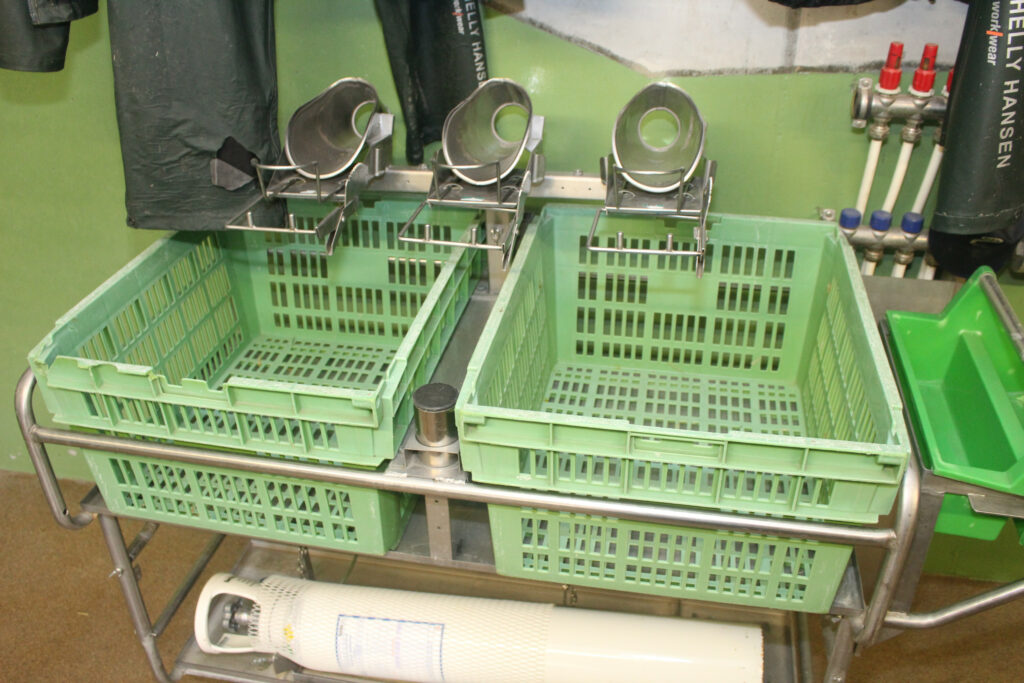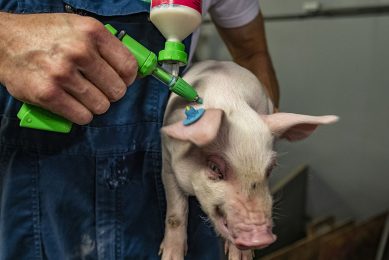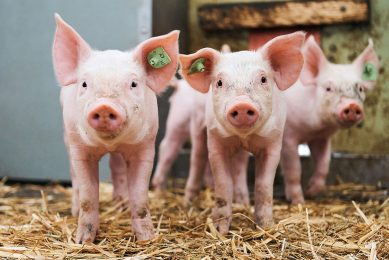Farm visit: For pigs, anything is possible in Switzerland
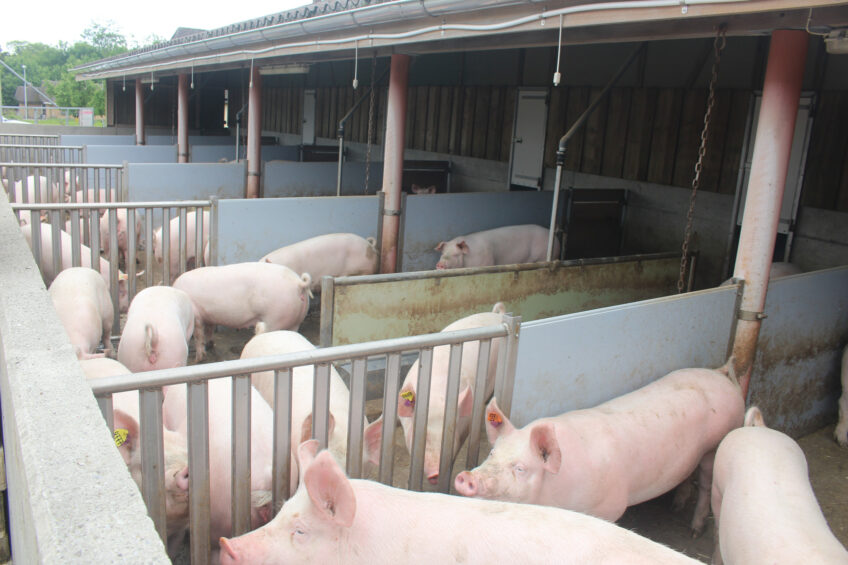
Imagine a farm with 160 sows, large amounts of space per farrowing pen, 3.5 employees, long tails, weaning at 32 days, straw everywhere and access to outdoors for most pigs – and making good money. Does that sound futuristic? Not in Switzerland – as there everything is possible.
With every door he opens, farm owner Fabian Reinmann, age 29, whistles a few times, announcing the arrival of some visitors. Whether the pink inhabitants understand the meaning – or whether they are simply good natured, that is not entirely clear. Fact is, however, that neither sows, gilts nor piglets do not seem overly impressed by their 2-legged onlookers. Yes, some get up and walk, but there is no sign of nervous massive running up and down a pen.


Calm animals
Calm animals, that is one of the traits that is characteristic for pigs in Switzerland. A trait that is much needed as well. After all, the country already met the concept of “free farrowing” becoming part of law in 1997, and in 2007 all farms keeping sows had to be converted to this system. To avoid confrontations with stockpersons or big accidents with newborn piglets, the sows that are most fitting for this system would have to be docile and easy-going. The national herdbook breeding programme Suisag therefore has already had roughly 20 years to include calmness as part of its breeding goals.
“Calm sows are a prerequisite for free farrowing,” Reinmann says. “Work safety for employees is much greater than with aggressive sows; there’s no need to fear biting sows. Calm sows are also very cautious with their movements in the pen and considerate of their piglets. Stressed sows move uncontrollably and cause more losses.”
Low pre-weaning mortality
And indeed, crushing is not much of an issue at Reinmann farm, located close to Langenthal, canton Bern, in Switzerland. On his farm, pre-weaning mortality is at 5.2% per litter – with 13.5 liveborn piglets and 12.8 piglets weaned. No wonder he often gets asked how. In terms of management, his daily practice is focused on making free farrowing a success.
He says, “A spacious pen (almost 8 m2, ed.) is crucial, allowing the sow to find a place to nurse and reducing the risk of piglets being crushed. A heated piglet crate (30°C) is also very important so that the piglets retreat to sleep and do not lie scattered throughout the pen.

“Wall brackets, which prevent the sow from lying directly against the wall, also reduce crushing losses. And room temperature must be kept low, to a maximum of 16-20°C, so the piglets will retreat to the nest.”
Breeder Suisag adds to these suggestions that breeding for vital piglets and high rearing rates also plays a role, just as Switzerland’s good health status.
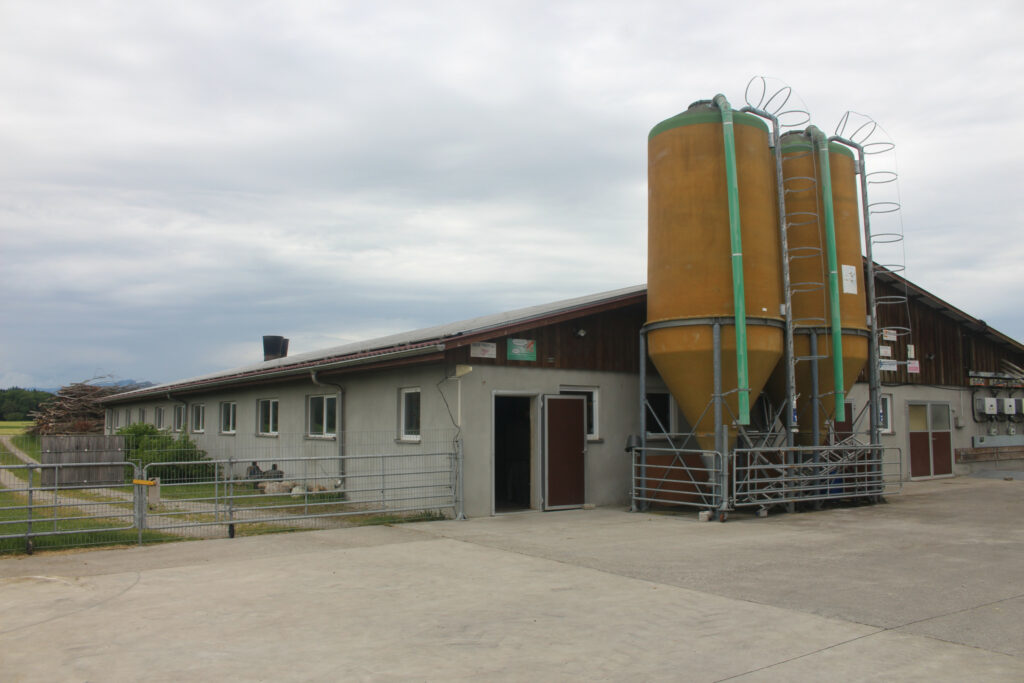
A nucleus farm in Switzerland
Within Suisag, Reinmann Farm operates as a nucleus. The farm’s main objective is producing Swiss Large White gilts. They get sold for about CHF 700-750 (about €750-800), prices which are higher than in the rest of Europe – for more about Switzerland and why the clock ticks differently over there, see box. Unlike nucleus farms elsewhere, the sows and gilts are allowed to go outdoors.
The selection process to decide which animals will make it to become breeding gilts is a process that is happening step by step, explains Reinmann. He says, “The offspring are all raised together. The pre-selection takes place as suckling piglets during marking, where animals with poor teats are sorted out. We do this ourselves. The actual gilt selection takes place at 80-100 kg. At this point, an external breeding technician comes to the farm and assesses the animals. These breeding technicians are trained by Suisag. Animals with insufficient feet and legs or breeding values are slaughtered.”
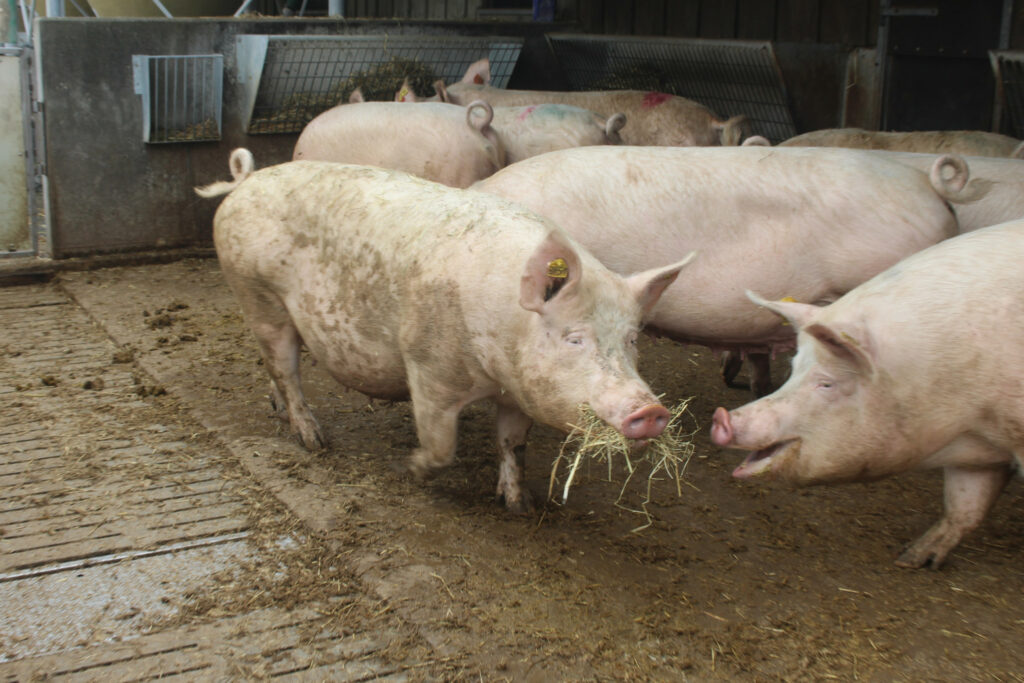
Insemination and gestation
A visit to the facilities starts with the beginning of the breeding cycle. After insemination with semen from Suisag, sows will stay in spacious crates of 1.4 m2 for 10 days maximum. During the rest of gestation, the sows will stay in the older houses of the farm. The animals are divided over 2 dynamic groups depending on age. Some sows reach parities 7, 8 or 9. The rooms are spacious and the sows have plenty of straw-filled hide-outs, including an outside area too. They can be seen being busy carrying around heaps of straw.
The animals are fed using Electronic Sow Feeding (ESF), and they have transponders in their ears. They receive liquid rations which is a mix of 90% complete feed, supplemented by 10% whey.
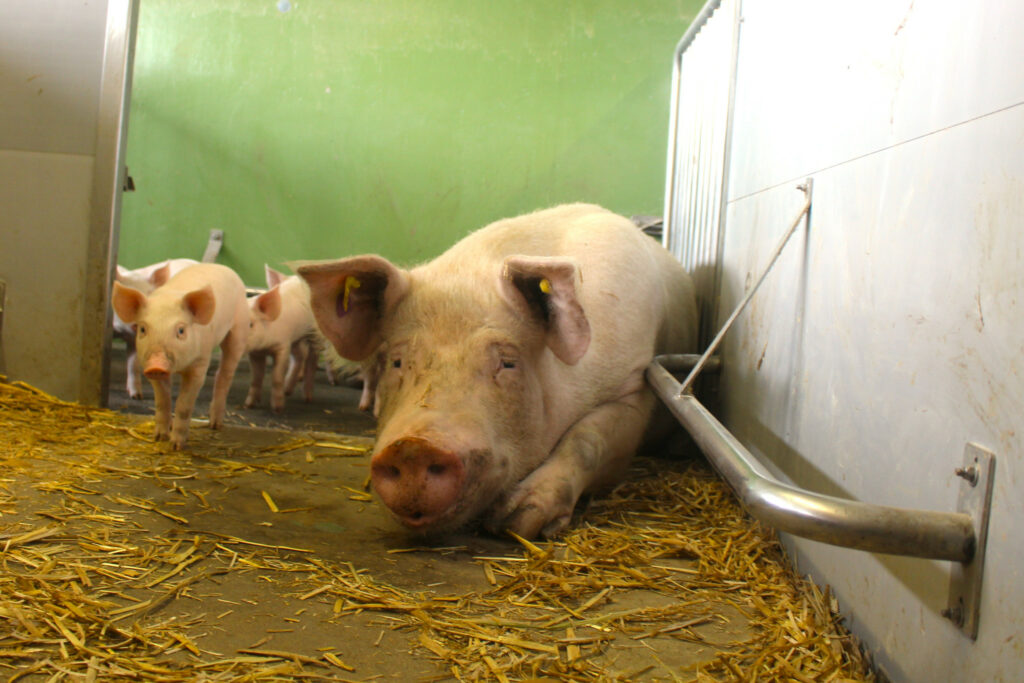
Farrowing area
There are 46 farrowing pens at Reinmann Farm, all measuring 2.20 m wide and 3.60 m deep. The farrowing pens each consist of three different “zones,” with a covered piglet nest in front, a central non-slatted laying zone with lots of straw – and no farrowing crate – and a separated slatted dunging zone towards the wall at the end. Environmental temperature is a pleasant 18°C.
The piglets are weaned at 32 days, when the animals weigh 10 kg on average. During lactation, the animals get vaccinated for PCV2, parvovirus, erysipelas, Glässer’s disease and L. intracellularis. The piglets also receive an iron shot between three to five days of age; castration occurs at ten days of age, after having been anaesthesised using isoflurane.
The farm operates in a 3-week-system. Farrowing are supervised during the day when they work in the barns. At night, however, sows farrow alone.
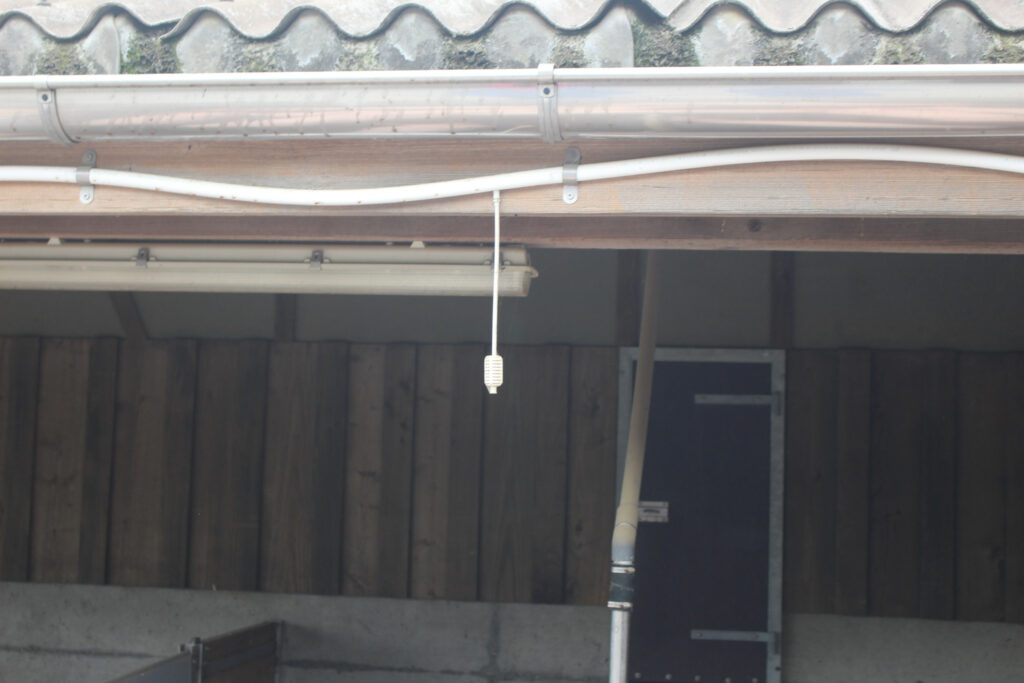
Growing area
After weaning, all grower pigs will be placed in long, central rooms. They are kept in groups with only a partially slatted floor. All growers receive liquid feed, on the basis of whey, supplemented by wheat, barley, corn and soy. The mixtures are bought from local feed producer UFA.
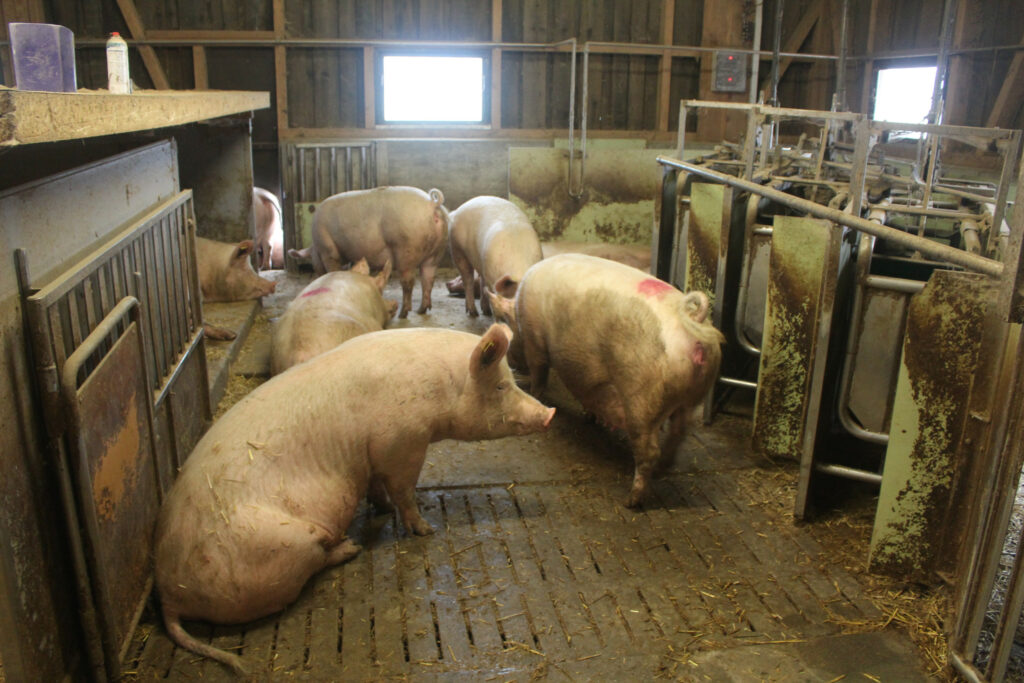
Gilt finishing
A next major selection takes place after the nursery phase, at around 25-30 kg. At that moment, all male and sub-optimal female piglets will go to finishing farms within a 10 km radius. The best female piglets will continue their career at Reinmann Farm. There are about 350 gilt finishing places. The best gilts will be sold as breeding gilts, at an age between 180 and 200 days.
The gilts are kept in spacious pens, each with remarkably large covers. The covers can be pulled up centrally when it is warm outside and lowered when temperatures are cooler. That way, no additional heating is needed yet. The pens are also adjustable in size. When the animals grow older, all Reinmann needs to do is pull the perimeter to the back and the animals have more space at their disposal.
The gilts can also go outside. Just like indoors, there is plenty of straw laying on the floor. At the far end of the outdoor area is a slatted floor, and Reinmann is encouraging the gilts to use that area for dunging. By keeping this area wet using sprinklers, the animals are discouraged to turn it into a resting place.
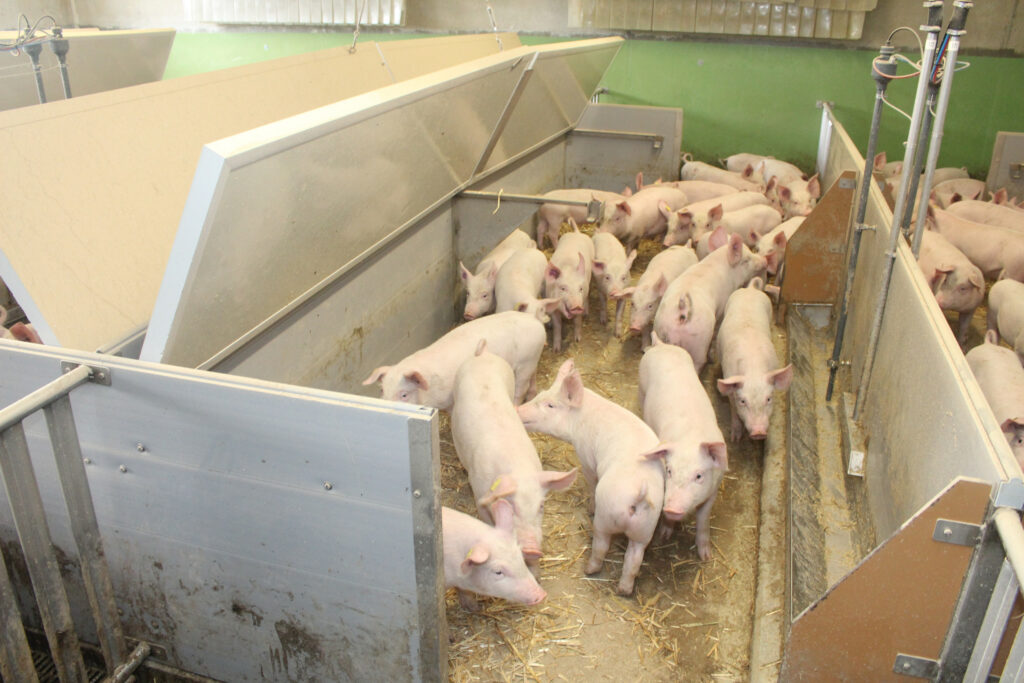
Future
As many farms in Switzerland, Reinmann Farm also receives subsidies. Those amounts fluctuate greatly, Reinmann explains. He says, “We receive mainly contributions for animal welfare programmes and some for agricultural land and the type of farming.”
For the future, Fabian Reinmann doesn’t have concrete plans (yet), as he literally just took over from his father, early 2025. He sees it as his first task to make sure the farm can be working more efficiently. Currently it costs a lot of time cleaning out all farrowing pens (every day up to 3.5 hour) as all animals have to be supplied with fresh straw.
